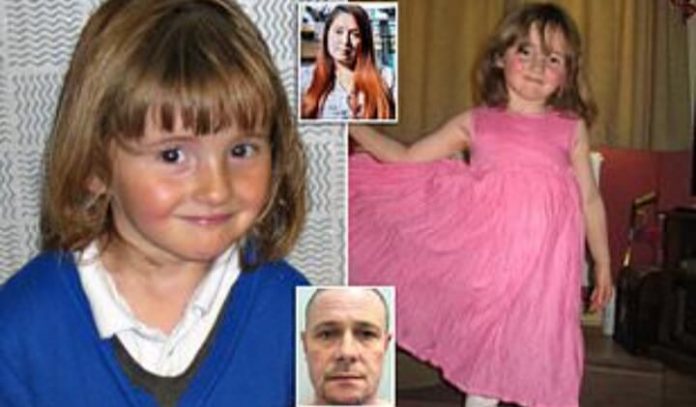5-year-old April was born with cerebral palsy, so she needed special care, which her big sister became expert in providing. The two sisters shared quite a bond, despite their 12-year age gap.
Jazmin Jones, the sister, was responsible for naming the little sister she adored. “My parents couldn’t decide; they were bickering about it,” she recalls. I just said: “Well it is the month of April, so why not call her April?”
She recalled one of her most vivid memories is of April sitting patiently at the bottom of the stairs, arms outstretched, waiting for ‘Ja’ (‘she couldn’t say Jazz, which is what everyone else called me’) to carry her up. “Her first word wasn’t Mum or Dad. It was Ja.”

Sadly, most people in Britain will be aware of the name April Jones. In 2012, she was just five years old when the little girl went missing from near her home, in the close-knit town of Machynlleth, Powys, it sparked the biggest search in British police history.
People travelled from all over the UK to try to help find the ‘Little Welsh Princess’ and bring her home. Tragically, it wasn’t to be.
Local man Mark Bridger, a former abattoir worker, was convicted of April’s abduction and murder. Now aged 57 and serving a life sentence.
April’s body was never found, although the Jones family have had to live with the horror of the most likely scenario. During Bridger’s trial, police revealed ‘strong evidence’ that fragments of bone found in a wood burner in Bridger’s home were humans.
April’s mum, Coral, said “He abused her,’ she says, face blank, all emotion spent. “They found her DNA in his pants. Then we think he chopped her up and burnt her, after whatever he did to her.”
After his arrest, he was discovered to have downloaded disturbing images of children, some pornographic, and accessed images of Holly Wells and Jessica Chapman, the schoolgirls who had been murdered in Soham, Cambridgeshire, in 2002.

But police also found photographs on his laptop of April — and Jazz. He had previously tried to communicate with her via Facebook.
An elaborate new three-part documentary will air next week on Channel 4, marking the ten-year anniversary of the case.
“He had tried to add me as a friend and I’d asked my dad ‘Who is this?’,’ Jazz recalls. “At the time (a year previously) we all thought it was strange that a man of his age would want to be friends with a teenager.”
Jazz and her mum were interviewed separately for the documentary and their very different ways of dealing with such a catastrophic loss were perhaps evident on the very first night April was missing.

On the evening of October 1, 2012, the little girl had been out playing on her bicycle (‘which was like her legs because her legs didn’t work properly,’ recalls Jazz) when she went missing.
The police response was immediate. It was the first time a U.S.-style nationwide child rescue alert had been issued in the UK.
But while April’s shocked parents, and the community at large, clung to the hope she would be returned, Jazz says she ‘knew’.
“I had a gut feeling. I remember standing outside later that night saying, I think it was to my dad: ‘She is not coming home.’ I hoped I was wrong. I hoped she’d just be playing at someone’s house, but I knew.”
“When she went, the whole thing just collapsed. Our family was fractured. Things are better now but, from that night, I didn’t have a mother. I had just lost my sister, and then I lost my mother too.
“I had to grow up overnight. I was on my own, really, trying to look after my little brother (just ten at the time), trying to help my dad.”
Although mom was present in the house, she was often absent physically — staying in bed for days at a time — as well as mentally. ‘I mean, I understand it now,’ says Jazz.
“My mum went into a deep depression. I can understand her headspace, now, but at the time I was saying: ‘You still have a daughter!
”’But I was the forgotten daughter. I know that sounds selfish, but I was 16 and I didn’t have a mother for the last few years of my childhood.’Afterwards, people would ask ‘How are your mum and dad doing?’ No one asked how I was doing.’
A decade on, Jazz has the maturity and experience to be able to sum up how she was doing — disastrously; trying to escape her own life.’At about 18 I started to drink heavily,’ she says. ‘When I drank I could forget my life, but that led to more rows at home.
She ended up spending less and less time at home ‘because it was easier to stay at my friend’s house’. It was her friend who pointed out that she was making the situation worse. ‘One day he said: ‘What would April think if she could see you?’ It has taken years of therapy for Jazz to work through a lot of these issues. Her resilience does shine through, however.
“We do have a good relationship now. It’s still up and down, but maybe more of a normal mother/daughter relationship. It’s been like this for about four-and-a-half years. But for six years, we didn’t have a relationship at all.”
More to come from the documentary – The Disappearance Of April Jones starts on Channel 4 on Monday, December 12 at 9pm.






